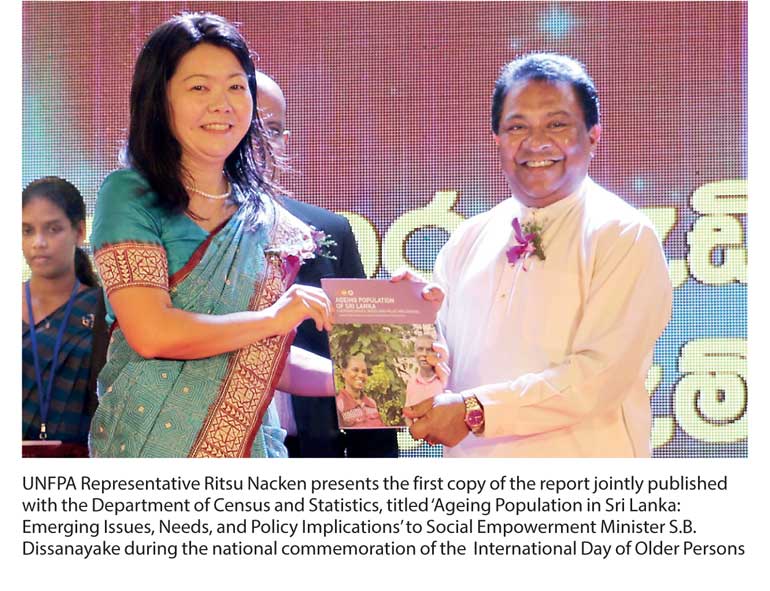Thursday Feb 26, 2026
Thursday Feb 26, 2026
Wednesday, 4 October 2017 00:00 - - {{hitsCtrl.values.hits}}

The Government needs to focus on special policies to address the needs of its elderly, particularly older women, as the country becomes the fastest ageing nation in South Asia, the United Nations Population Fund (UNFPA) said in a new report yesterday.
In 2012 there were 2.5 million people or 12.4% of Sri Lanka’s population living above the age of 60 years, according to the latest available statistics.
The Sri Lankan population is ageing at a faster rate than other South Asian countries and has been increasing rapidly since the 1980s. Between 1981 and 2012, the proportion of the population aged 60 years and above has increased from 6.6% to 12.4%, the report said.
The median age of the Sri Lankan population has also increased from 21.4 years to 31.0 years for the 1981-2012 periods, which is much higher than other countries in the South Asian region.
Rapid demographic transition with a marked decline in death rates and birth rates and increases in life expectancy are leading to important changes in age-sex structure.
The life expectancy at birth for males and females has been reported as 72 and 79 years respectively and females often lived six years longer than their male counterparts in 2012.
“Comprehensive policies and programs need to address the inequalities experienced by the majority of the older population in Sri Lanka,” the report said. “Hence it must be recognised that the older population are contributors to sustainable development.”
Older women in particular need protection to ensure their wellbeing in old age.
“It is also important to support current working-age women’s employment participation, so that women can have a stable income during their working age, thus can plan and be prepared for retirement, reducing their vulnerability in their old age,” the report added.
The change in age structure and an increasing old-age population will result in a significant reduction in the support base for the ageing population in Sri Lanka. In 1981 there were on average seven persons (age 20-59 years) to provide support for one older person and in 2012 the number dropped to four persons.
Currently only 34% of Sri Lankan women are employed in the formal sector. The Sri Lankan Government in its latest economic policy document has expressed the need to improve this segment.
There were 382,496 more widows than widowers. There were five districts, namely Colombo, Kalutara, Gampaha, Kandy and Kurunegala, which had more than 30,000 elderly widowed females.